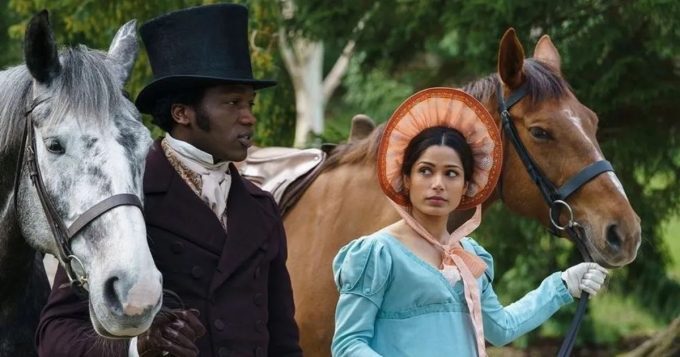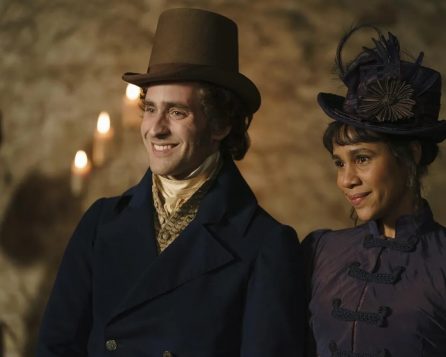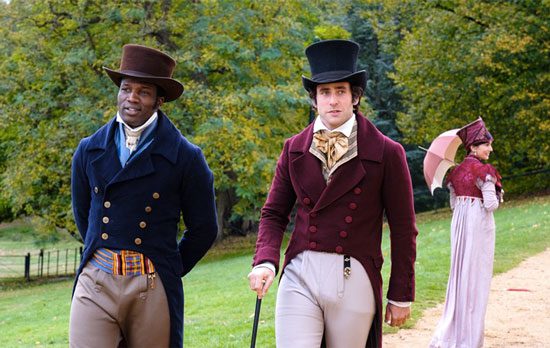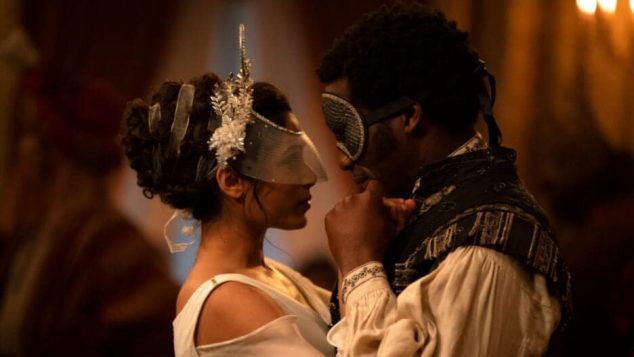Movie Review: ‘Mr. Malcolm’s List’ — The search for the perfect wife
Reviewed by Jeffrey Sanzel
With the success of Bridgerton, Regency has currently eclipsed Victoriana as the go-to for period drama. While Jane Austen’s seminal work, Pride and Prejudice, has never been far from television and cinema, Dickens has more often been the primary source for historical adaptation.
In 2009, Suzanne Allain self-published Mr. Malcolm’s List and adapted it for the screen. After a 2015 podcast reading, Emma Holly Jones acquired the rights along with producer Laura Rister. A short film titled Mr. Malcolm’s List: Overture, directed by Jones, was released online in 2019. Subsequently, the novel was published by Berkley Books in 2020.
The year is 1818, a time of tea and quills, empire waists, and oversized top hats. Mr. Jeremiah Malcolm (Sope Dirisu), the wealthy second son of an earl, seeks a bride. With “twenty thousand a year,” looks, and charm, he is the season’s catch. Courting and then moving on, none of the prospective ladies match the criteria on the titular list. These items include an amiable disposition and a knowledge of politics, a sense of charity, and a host of other desirable traits.
The lovely but vaguely shallow Julia Thistlewaite (Zawe Ashton) fails to engage him during their time at the opera. Shortly after, a humiliating newspaper caricature featuring Julia’s rejection circulates throughout London. Bent on revenge, the spurned Julia—now out for a crushing four seasons—sends for her friend Selina Dalton (Freida Pinto). Julia grooms Selina as the perfect trap for Malcolm by having her embody all of the things on the list. Daughter of a poor Sussex vicar, Selina—surprise, surprise—is the perfect match for the man.
While the plot is simplistic, it fits logically into the Regency world. With drawing rooms and drinking clubs, Mr. Malcolm’s List comfortably evokes the environment, if not the works of Jane Austen. The priority of marriage and money swirls around the principals, cloaking them in the power of society and the prevailing poison of gossip. Here, “what people say is what matters,” and often, they are “judged and found wanting.”
The elements for a delightful romp into the intrigue of romance gather at the outset as Julia launches into action.
So why doesn’t it work? The answer is simple: They are all too nice. Everyone is not just charming but, for the most part, kind. Even Julia, at her most vindictive, manages to be likable. The narrator states that Malcolm is a nice person. He is no Mr. Darcy, with his haughtiness and self-absorption. He has the reputation of a “trifler”—but his actions seem to belie this. Selina has no side to her; absent is the delightful edge that Elizabeth Bennet possesses, which gives her character dimension.
Also, there is a dearth of characters that are “more than.” One looks for the mercenary Mrs. Bennet, the oily Mr. Collins, or the roguish Wickham. Here, only two minor characters—an older gentleman pursuing Selina and Selina’s twice-wed cousin, the flittering Mrs. Covington (a welcome scenery-chewing Ashley Park)—approach anything resembling the appealingly grotesque. The overall blandness of nice people makes for what amounts to a tedious two hours.
Pinto is smart, strong, and always watchable. She never allows Selina to become petulant, even when most frustrated. Dirisu embodies Malcolm with a wryness that peeks throughout. His good looks, rich voice, and ability to make even the smallest shift count create a likable (if too likable) protagonist. Oliver Jackson-Cohen manages to elevate the sidekick caught between opposing factions, mining the humor; sadly, he mostly disappears halfway through the film. Given the character’s inconsistency, Ashton finds some arc in Julia. Divian Ladwa’s servant John is funny but short-changed, as are all the “below stairs” characters.
There are weighty discussions about life and love but little wit. Sparks require friction, and the film lacks discord. Even the gossip appears fangless, and the hurdles seem low. Allain’s screenplay is so by the numbers; there is never doubt, not just about the outcome but what will happen moment to moment. Jones’ direction captures time and place but lacks tone. A vague sitcom quality hovers around the edges, including Selina’s clumsy training montage. The costumes and settings are detailed, lush, and a visual feast. But these are not enough to sustain interest.
Comparisons can easily be made to Bridgerton, especially in the show’s second season, a less-than-subtle take on Pride and Prejudice. Both are style over substance. But where Bridgerton manages to find some surprising choices, the facile and often banal Mr. Malcolm’s List offers no such revelations.
In the end, one would hope for more Thackeray’s Vanity Fair and less Hallmark Movie of the Week. Nice is nice. But it isn’t fun.
Rated PG, the film is now playing in local theaters.











